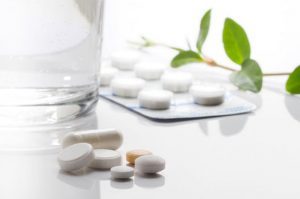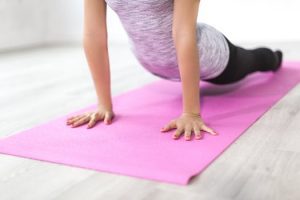
28 Oct TOP 8 STEPS TO IMPROVE YOUR DIGESTIVE HEALTH!
 First and foremost seek the help of a professional such as a registered dietitian.
First and foremost seek the help of a professional such as a registered dietitian.
A registered dietitian can evaluate your diet and provide education and guidance to get you on the right path to improve your digestive health! You no longer need to suffer with embarrassing and uncomfortable digestive issues. A nutrition expert, especially one that specializes in digestive health, can give you the tools you need to follow and low FODMAP diet and heal your gut.
Eliminate all high FODMAP foods from your diet completely
 It’s essential to eliminate foods that are high FODMAP entirely for 2-6 weeks in order to determine if SIBO truly is the cause of your digestive issues, and to heal your gut before the reintroduction phase. Even one high FODMAP meal can completley throw things off in the beginning. Watch out for foods that contain non -digestible ingredients such as sugar alcohols. They are food for bacteria to grow off of uncontrollably. Sugar alcohols are in many high FODMAP fruits and vegetables but are often a hidden ingredient in low sugar energy bars, beverages, chewing gum, and sugar free foods.
It’s essential to eliminate foods that are high FODMAP entirely for 2-6 weeks in order to determine if SIBO truly is the cause of your digestive issues, and to heal your gut before the reintroduction phase. Even one high FODMAP meal can completley throw things off in the beginning. Watch out for foods that contain non -digestible ingredients such as sugar alcohols. They are food for bacteria to grow off of uncontrollably. Sugar alcohols are in many high FODMAP fruits and vegetables but are often a hidden ingredient in low sugar energy bars, beverages, chewing gum, and sugar free foods.
Make sleep a priority
Try to stop eating at least 3 hours before lying down for healthy digestion. Eating too close to your bedtime can cause disruptive sleep because your body does not have adequate time for proper digestion. This can also lead to digestive issues such as heartburn, stomach cramps and stomach distress upon waking. Make sure to get adequate sleep and keep your sleep schedule consistent. Lack of sleep leads to sluggish digestion, and can be a major contributor to gastrointestinal distress. Believe it or not, more melatonin is found in the digestive system than the brain. Within the gut, melatonin plays a large role in motility and inflammation. When your schedule is thrown off, your digestive system is likely to be thrown off as well.
Supplements to add to your diet
 Magnesium, turmeric curcumin, oregano oil, zinc and L- Glutamine are all beneficial for gut health. Probiotics can be beneficial in some cases but in many cases they can make symptoms worse. Some GI specialists recommend avoiding probiotic supplement and probiotic containing foods. If you decide to try a prebiotic/probiotic supplement Regular Girl is approved by the Monash Clinic (the authority on the low FODMAP diet), and is verified as low FODMAP.
Magnesium, turmeric curcumin, oregano oil, zinc and L- Glutamine are all beneficial for gut health. Probiotics can be beneficial in some cases but in many cases they can make symptoms worse. Some GI specialists recommend avoiding probiotic supplement and probiotic containing foods. If you decide to try a prebiotic/probiotic supplement Regular Girl is approved by the Monash Clinic (the authority on the low FODMAP diet), and is verified as low FODMAP.
Stay well hydrated!
 Inadequate consumption of fluids can cause all types of problems. One of them being constipation. However, It can be a catch 22. If you drink excessive amounts of liquid at the same time you’re eating it may cause temporary bloating, discomfort and slowed digestion. It’s best to drink water between meals and take small sips of liquid during meals. Also, keep in mind that it takes 90 minutes for water to go through your body. If you have a tough workout and then drink an excessive amount of water too close to a meal, you may experience temporary bloating and discomfort.
Inadequate consumption of fluids can cause all types of problems. One of them being constipation. However, It can be a catch 22. If you drink excessive amounts of liquid at the same time you’re eating it may cause temporary bloating, discomfort and slowed digestion. It’s best to drink water between meals and take small sips of liquid during meals. Also, keep in mind that it takes 90 minutes for water to go through your body. If you have a tough workout and then drink an excessive amount of water too close to a meal, you may experience temporary bloating and discomfort.
 Stress, anxiety and time constraints can take it’s toll on gut health and “normal” digestion. When people are rushed when they are eating, or under stress, they tend to not chew their food well, take in excess air, not breath properly and tense up their muscles. This can lead to heartburn, cramping, bloating and indigestion. It can also interfere with normal gastric motility and peristaltic movement of the small intestine. Make it a priority to sit down and relax when you are eating!
Stress, anxiety and time constraints can take it’s toll on gut health and “normal” digestion. When people are rushed when they are eating, or under stress, they tend to not chew their food well, take in excess air, not breath properly and tense up their muscles. This can lead to heartburn, cramping, bloating and indigestion. It can also interfere with normal gastric motility and peristaltic movement of the small intestine. Make it a priority to sit down and relax when you are eating!
Establish healthy eating habits
Some people make the mistake of going too long without eating. This can actually CAUSE bloating. It sounds backwards but it’s true and it can be a vicious cycle. The reason is because when you hungry your body will typically produce excessive stomach acid, leading to bloat and discomfort. Unfortunately, when people are feeling this way they typically don’t want to eat and the feeling will continue.
Try establishing healthy eating habits such as such as eating every 3-4 hours, sitting down to eat, eating slowly and chewing your food well, and stopping eating 3 hours before your bedtime.
Include regular exercise as well as meditation or relaxation time, and breathing exercises
 All type of exercises can improve digestive health. Even stretching is better than no movement at all. A main cause of constipation is lack of movement. Exercise will get things moving and will help relieve stomach cramps, bloating and gas. Exercise is also a stress reducer and mood lifter. Light walking is recommended after a meal to aid in digestion but intense exercise too close to eating is not recommended and can cause heartburn, nausea, cramping and other digestive issues. Try to be active and include exercise daily.
All type of exercises can improve digestive health. Even stretching is better than no movement at all. A main cause of constipation is lack of movement. Exercise will get things moving and will help relieve stomach cramps, bloating and gas. Exercise is also a stress reducer and mood lifter. Light walking is recommended after a meal to aid in digestion but intense exercise too close to eating is not recommended and can cause heartburn, nausea, cramping and other digestive issues. Try to be active and include exercise daily.
